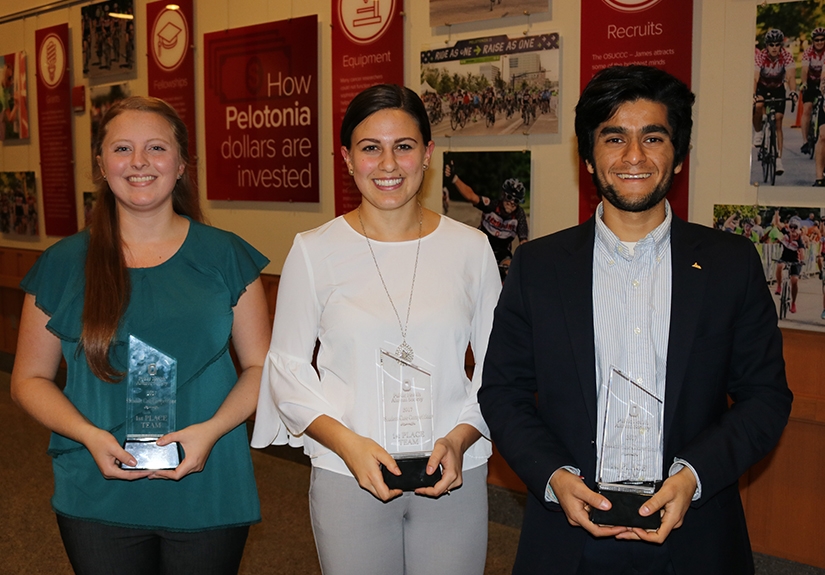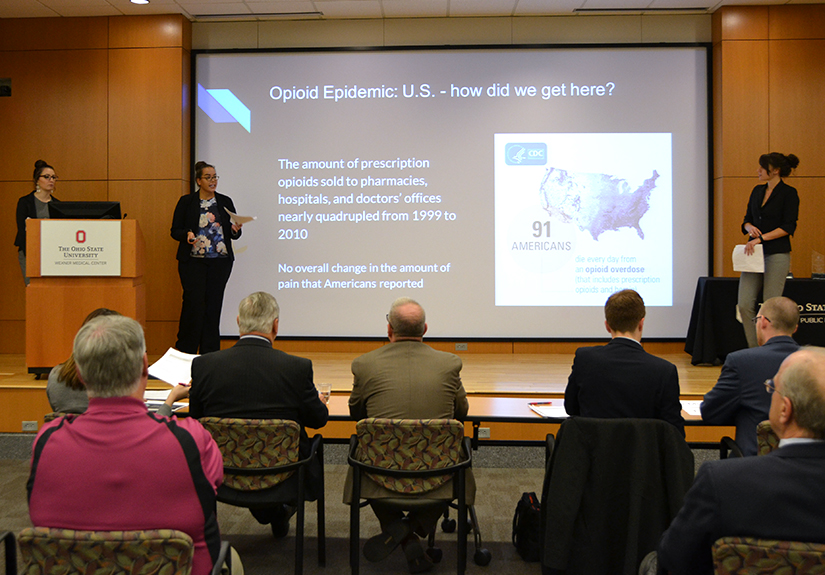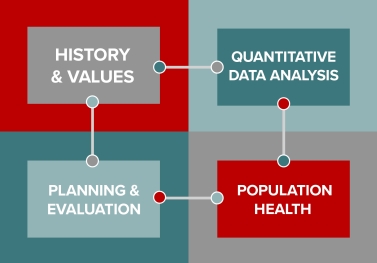Teams of students presented their intervention strategies for opioid abuse in front of county health officials, CPH faculty and peers.

The winning team (from left): Amber Moore, Maddie Drenkhan and Vikas Munjal, all in the final year of earning their Bachelor of Science in Public Health degrees.
Teams of students from The Ohio State University College of Public Health presented strategies for reducing the burden of opioid misuse and opioid-related deaths in Hocking County, Ohio, to county health officials in the inaugural CPH Student Case Competition on Wednesday.
The competition, organized and hosted by the College of Public Health Alumni Society, challenged teams of undergraduate and graduate students to spend two weeks developing population health intervention strategies based on the county’s community health assessment data, and existing resources and programming.
“As you know, the opioid epidemic in our city, state and country is a major public health crisis,” CPH Dean William Martin II, MD, said in his opening remarks at the event. “This case competition is an opportunity for our brightest public health students to test their skills in finding solutions to a real-life crisis.”
The teams presented their work in front of a panel of judges that included Doug Fisher, DPM, health commissioner of Hocking County; Bill Dunlap, deputy director of the Athens-Hocking-Vinton Alcohol, Drug Addiction and Mental Health Services Board; and Kathryn Lancaster, PhD, MPH, assistant professor of epidemiology at CPH.
Each team was evaluated and scored on their ability to describe the scope of opioid and substance misuse in Hocking County; their analysis of current strategies; their selection of the appropriate population health model to implement, along with outcome measurements, evaluation plan, budget and limitations; and the professionalism of their presentations.
“I think it’s a good application of everything we’ve been learning in school,” said Sara Godina, competition participant and second-year student earning her Master if Public Health in epidemiology. “It’s a real-world application of a public health problem, and that’s what we’re in school for.”

A team of CPH students presents background of the opioid epidemic in the U.S. during the CPH Student Case Competition.
The winning team from the competition included Vikas Munjal, Amber Moore and Maddie Drenkhan, all in the final year of earning their Bachelor of Science in Public Health degrees. They have been invited to present their strategies at the Ohio Public Health Combined Conference in May 2018.
“It just kind of reassures our future in public health,” Fisher said. “Interacting with the students and seeing what kind of quality OSU is producing as far as public health students—that’s one of the main things I gained and was reassured about.”

CPH alumnus Zeb Purdin (left), one of the competition's organizers, sits beside the panel of judges (from left): Doug Fisher, DPM, health commissioner of Hocking County; Bill Dunlap, deputy director of the Athens-Hocking-Vinton Alcohol, Drug Addiction and Mental Health Services Board; and Kathryn Lancaster, PhD, MPH, assistant professor of epidemiology at CPH.
View the presentations by team 1, team 2, team 3 (winning team), and team 4.











